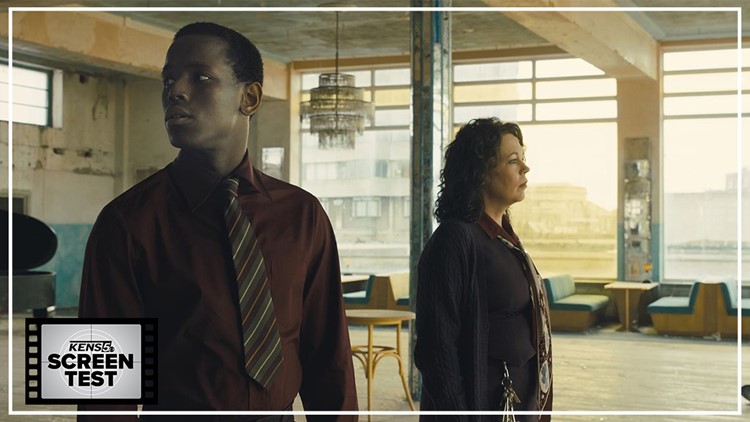SAN ANTONIO — In the sacred space that is the Empire theater projection booth – a shanty cubbyhole nestled between this beachside cinema’s heaven and hell, or rather its present and its past – Toby Jones’s dutiful wizard-behind-the-curtain, Norman, explains the magic of the medium to young Stephen (Michael Ward).
With the gentleness of a village elder passing on his knowledge, Norman elegantly speaks about “the illusion of motion, the illusion of life” that constitutes movies, a modern wonder made possible thanks to all the “complex machinery” that sits out of the audience’s sight, under the watchful eyes of Nicholson and Brando and more of cinema’s deities. Stephen listens intently; he knows that just being here is a privilege not all his coworkers have, though it isn’t made clear why exactly Norman decided to welcome him in at all. Maybe he just felt like impressing someone. Maybe director Sam Mendes did too.
Underscored by a twinkling lullaby melody by Trent Reznor and Atticus Ross, and the typically exquisite shot selection by cinematography royalty Roger Deakins, this scene in Mendes’s “Empire of Light” is an awkwardly placed vignette that’s otherwise easy enough to appreciate, if only because you can sense the director sweating his need for us to appreciate it. Most viewers will in the moment, if with a limp shrug of their shoulders; one can imagine Mendes growing the rest of his tenth feature directorial effort from the seeds of Norman’s monologue, grasping for a kind of profundity that’s explicitly stated throughout “Empire of Light” but rarely glimpsed or felt by those bearing witness.
What’s clearer to see is the symmetry between Norman’s words and their having been written by the filmmaker who last brought us “1917,” the one-superlong-take war picture so committed to testing the limits of craft that its making-of documentary is more compelling than the movie itself. It’s been three years since Mendes improbably lost out on personal Oscar gold for “1917,” despite the strong pedigrees assembled for a project that had ostensibly secured Academy Awards success before anyone had even seen it.
Three years later, “Empire of Light,” a chronicle of the titular cinema’s troubled employees, arrives with more frontloaded expectations, adding a dash of AMPAS-grade period-piece atmosphere to the mix – the setting is 1980s coastal England, where even sunny days feel frosted over – as well as perennial Oscars disruptor Olivia Colman and the kind of gentlemanly British affect that I suppose American viewers (and voters) are meant to view as regal.
The approach works for a time. A lovely opening montage introduces us to the theater where “Empire of Light” almost entirely unfolds, simmering shots of “No entry” signs and darkened box offices creating the impression that it’s been abandoned. In actuality it’s just a few minutes away from opening time; Colman’s Hilary, the theater’s second-in-command, soon arrives to flip on the lights and warm the popcorn. Initial marketing materials for “Empire of Light” were met with declarations that this was Mendes’s love letter to cinema, but its introductory scenes allude to something far more haunting, unfinished and perhaps unanswerable.
That suspicion extends to Hilary, portrayed pensively and mysteriously by Colman. Living alone and working dutifully, very little defines her days other than the Empire, her static place in life and the medical appointments where a doctor says she appears to be doing better, not clarifying further. At about the same time, we notice something about the condition of the movie itself: the minimalism of its soundscape. We peek into the Empire’s ornate screening rooms, but don’t hear laughs or applause. We see people walking outside, but the chatter of civilization is reduced to a barely-there rumble. It’s as if Hilary lives on the periphery, her most intimate encounters coming in the locked office of Colin Firth’s slyly ruthless theater manager taking advantage of his position.
Then Stephen enters the picture, a young Black man whose own uncertain position in the world is underscored in due time. He and Hilary appear to find in each other kindred spirits, despite the decades that separate them and the utter lack of believability that accompanies their increasingly physical relationship. Much is meant to be accepted at face value in “Empire of Light,” but little about how this self-satisfied story unfolds measures up to the beauty of Deakins’s images, the care of production designer Mark Tildesley’s sets and the compelling way the Empire theater always seems to be revealing new corners of itself, as if the structure were detached from time and space. Up in the closed-off levels where Hilary and Stephen sneak off to is another world separate from an ostensibly more perilous one that awaits outside; whether intentional or not, the film’s most potent suggestion is that sometimes we can only be one with the world by floating above it.
Mendes has certainly taken that ghost-story ethos to heart, given how intricately stitched a cinematic garment “Empire of Light” resembles but having forgotten the human element to fill it out. So overpowering is the film’s stately approach that it turns disaffecting, and when Hilary’s background is finally revealed it feels gimmicky at best, ill-considered at worst. There’s an arc to the movie’s urgency – at one moment it practically shocks itself awake – but no evolution to its sense of feeling, which renders the whole thing a bit two-dimensional when the canvas is so rich in its aesthetic details.
What Mendes has overlooked with his latest effort, despite Norman’s sermon about frames and light and cameras, is that movies need more than just light to function as movies. They need structure, design, angles and, yes, darkness too. That last element, at least, is here in spades; at its most thematically illustrative, Deakins’s cinematography literalizes light born from darkness in his typically majestic ways, while the emotional scarcity of Mendes’s screenplay only serves to emphasize its most antagonistic forces.
Between “Empire of Light” and “1917,” Mendes now has two screenplay under his belt—and two examples of why he’s perhaps always been better at marshaling the medium’s tools rather than picking them up himself. His hardened callus renders the movie inert; it’s simultaneously about so much and also nothing at all. He sets out to explore the condition of the world by way of several sociological threads but finds himself impossibly knotted up in them.
"Empire of Light" is rated R for sexual content, language and brief violence. It opens in San Antonio theaters Friday. Runtime: 1 hour, 55 minutes.
Starring: Olivia Colman, Michael Ward, Colin Firth, Toby Jones
Written and directed by Sam Mendes
2022
---
>MORE REVIEWS:



